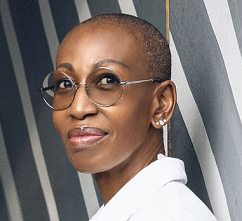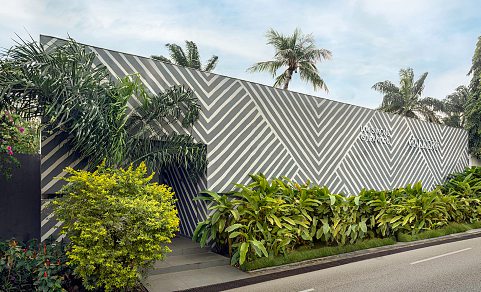Gazelle Guirandou:
Passing on a love of art
Gazelle Guirandou is a leading figure on the Ivorian art scene who runs the LouiSimone Guirandou gallery, which she founded with her mother in 2015. She has dedicated herself to promoting artists.
AM: Your mother, Simone Guirandou, is a pioneer among Abidjan gallery owners. You've now taken over from her. How did this transmission come about?

Gazelle Guirandou: During the holidays, my mother used to take the whole family to museums and galleries. As a child, I felt like I was being forced to go. However, being curious, I wanted to find out more. And then I was hooked, and art became my passion. In the 1990s, artists from all over the world came to meet my parents; that's how we grew up. So when my mother thought of reviving the garden in which we used to entertain artists, I thought it was a wonderful idea. I'd been wanting to go back to Abidjan, and this was an opportunity to have a space of my own, where I could have fun and be in direct contact with the artists. We became partners, and then I took over as full-time director in 2018.
How do you select the artists you want to show?
My mother and I used to do the selection together. Now, it's something I discuss in detail with my team, which is almost all women. I often have an instant preference. When I meet artists, I establish a dialogue, which is fundamental. They have to feel at ease with us. On my side, I have to visit their studio, feel and experience the works. For example, I met Oumar Ball in Dakar and, after visiting him in Mauritania, offered him his first solo show in Côte d'Ivoire. I discovered Malian artist Ange Dakouo through a friend. This year, we've had many solo shows: photographer Aida Muluneh, who we're exhibiting in September, and Alun Be for Africa Foto Fair at the end of the year. My approach is to get a dialogue going between the works and the artists. And not just African artists, because I like to build bridges.
You also run group exhibitions, such as ‘Découvertes’, dedicated to emerging artists.
I started ‘Découvertes’ to give them a chance to show their work. The gallery attracts a lot of visitors in the summer, and we wanted to take advantage of this to give young talent some exposure. You can see the reactions of the public, the collectors, the artists... It's an opportunity to envisage the future with them, and for them to understand how to evolve as artists. It's an enriching experience. Here, for example, we have Juju Lago, who photographs people with albinism - a powerful and moving project. For us to show their work, it has to be worthwhile. That's easy with established artists. But every major artist started out as an emerging artist. And I think it's up to us to encourage them, to push them, to support them.
You've been observing the local arts scene for as long as you can remember. How has it evolved?

In my mother's day, it was vibrant, though contemporary African art wasn't yet being discussed. Today, the movement has really picked up. There are a lot of people interested in artistic production. And the continent's young people are talented, curious and have something to say. They depict positive aspects of everyday life through their paintings, sculptures and tapestries... But they also deal with subjects such as mental health, traditions and the family, with a cross-cultural or local interpretation. It's rich and it works well. There are an increasing number of fairs, such as those in Joburg and Cape Town, as well as 1-54. This is encouraging for young talent. There is still work to be done, of course, especially when it comes to taxes. Governments don't understand that a gallery is not a shop. The works don't belong to us and the artist must be paid. We need to make them more aware of our profession. Slowly but surely, we'll get there.